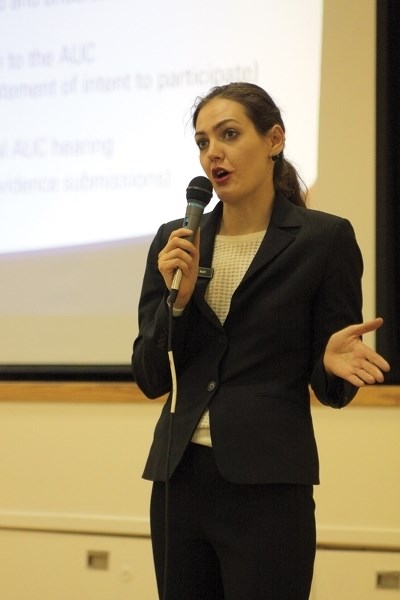Area residents were educated on how to participate in Alberta Utilities Commission’s (AUC) summer public hearing process, the final step in determining the fate of the proposed $1.49 billion Fort McMurray West 500-kV Transmission Project.
On Wednesday, Jan. 27, approximately 50 residents turned out for the informational session at Westlock and District Community Hall and learned how to become involved in the hearing process, which commences June 6.
The summer hearing will determine which of the proposed routes, the west route (through Barrhead) or the east route (through Westlock), will be selected.
“We’re near the beginning of [AUC’s] review process, so this is basically trying to get people aware of the application and how to get their voice heard before the decision is made,” said AUC spokesperson Amanda Brinker.
“It’s early on, and we’re trying to get out as early on as possible to get people registered and to understand our review process and how they can get involved.”
Affected residents can participate by preparing a written submission, or by participating in the hearing process by presenting oral evidence to the commission panel.
They must file a statement of intent to participate, or a written submission with the AUC by Feb. 12.
“I’m going to encourage you, that if you are affected by either route for the transmission line, to come and speak to the commission panel,” said AUC legal counsel Shanelle Sinclair.
“This is for a simple reason that it’s much more persuasive for you to tell the panel what your concerns are than to have a written submission.”
Those who occupy or are entitled to use land that is directly affected by an AUC decision are given local intervener status and are said to have ‘standing’ in the process.
People who own property within 800 metres of the edge of rights-of-way of a proposed route are also given ‘standing’, subject to objections.
Those outside the 800-metre zone can still participate, but must apply to the AUC for ‘standing.’
Residents looking to participate are encouraged to form into groups in order to save on legal costs, which are reimbursable through the commission.
After the submission deadline, interveners are able to submit questions to the applicant, which must be responded to. Interveners must also submit written evidence prior to April 1.
Brinker said people affected by either route to participate in the process.
“It’s likely more common that the preferred routes are chosen, however, sometimes people on the alternate route think ‘we’re on the alternate route, we don’t need to speak up,’” Brinker said.
“As consequence, a lot of people on the preferred route show up and alternate route people don’t show up, so then the commission has a lot of objections to the preferred and none for the alternative. We would likely approve the alternate route because nobody spoke up against it.”
Brinker said once the hearing starts, it could last up to four to six weeks, depending on the number of participants and likened it to a court proceeding. Upon the conclusion of the hearings, AUC has 90 days to reach a decision.
While Alberta PowerLine, the company behind the 500-kilometre project, has selected the west route as its preferred route and the east route as the alternative, the commission is not bound by the selection.
“One is labeled preferred, one is labeled alternate and the commission can pick either route in this application as well as any variant,” Sinclair explained.
So far the AUC is seeing a lot of interest in the application.
“We’re seeing a lot of registered participants, even before we issued our notice, which is uncommon,” Brinker said.
“There’s significantly more participants even before the deadline than most of our applications.”
Brinker said a location for the hearing has not yet been set, but will be held in a central area where most of the applicants are located. She said at this time Westlock, or Barrhead are the most likely to be chosen.



